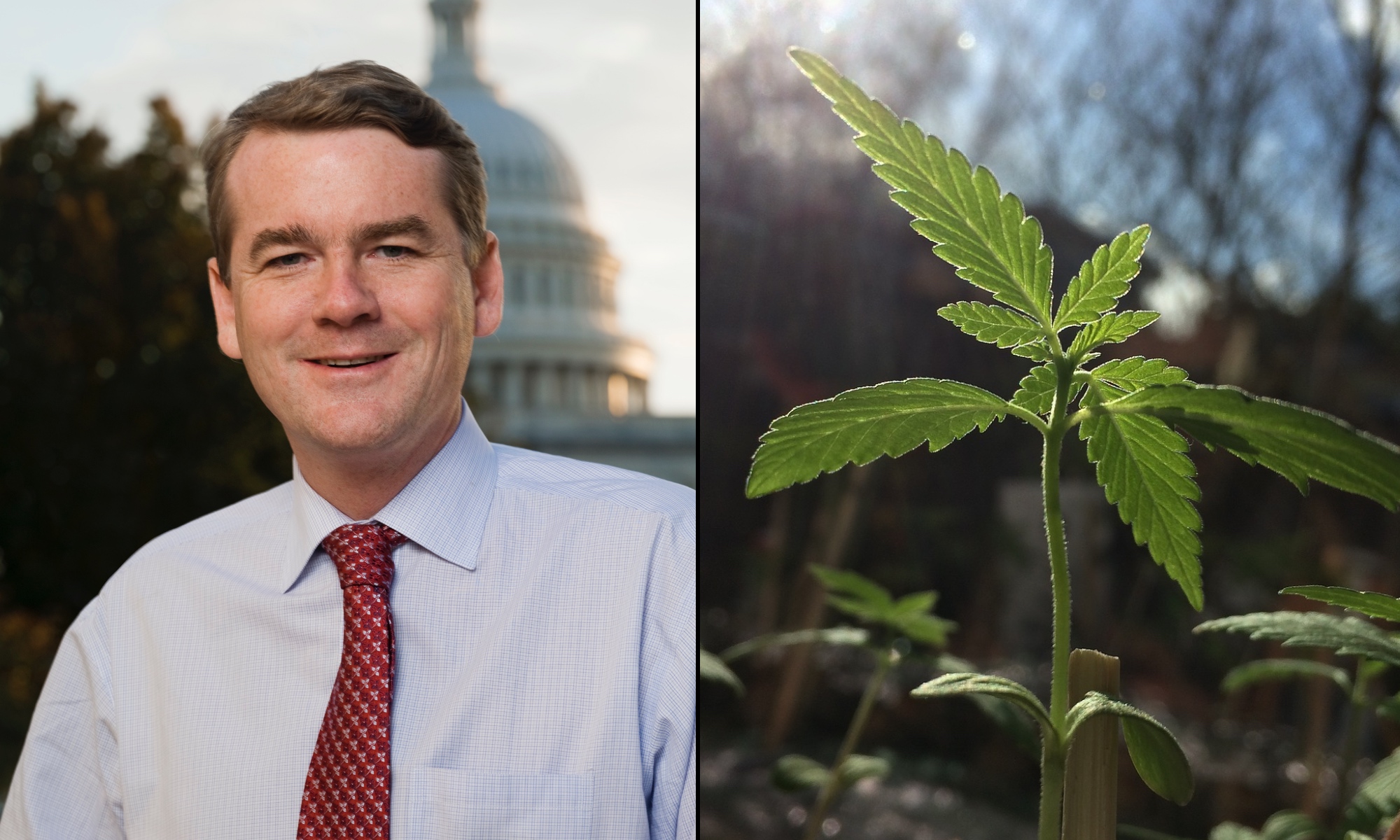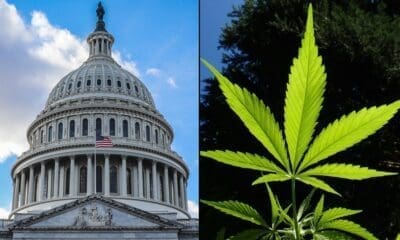Politics
Where Presidential Candidate Michael Bennet Stands On Marijuana

Sen. Michael Bennet (D-CO) announced on May 2, 2019 that he is seeking the 2020 Democratic presidential nomination and he dropped out of the race on February 11, 2020.
The second Coloradan to enter the race, Bennet opposed his state’s 2012 marijuana legalization initiative but has since supported several wide-ranging cannabis bills in the Senate following voters’ approval of the measure. NORML gives the senator an “A” grade.
This piece was last updated on February 11, 2020 to include the candidate’s statements and policy actions on marijuana since joining the race. It will continue to be updated on a rolling basis.
Legislation And Policy Actions
The only piece of cannabis-related legislation Bennet has been the chief sponsor for is a 2017 bill to ensure that industrial hemp farmers are able to access federally controlled water.
“This bipartisan legislation provided needed clarity for farmers in Colorado who want to grow industrial hemp legally,” Bennet said in a press release. “This is a necessary measure to fix conflicting federal policies that are slowing the implementation of the Farm Bill pilot program and stifling new business opportunities in rural Colorado.”
He has also signed on to over a dozen marijuana bills as a cosponsor, including the Marijuana Justice Act, which would federally deschedule cannabis, penalize states that continue to enforce marijuana laws in a discriminatory way and reinvest funds into communities disproportionately impacted by the war on drugs.
Bennet also cosponsored the Strengthening the Tenth Amendment Through Entrusting States (STATES) Act during the 115th and 116th Congresses. That legislation would amend the Controlled Substances Act (CSA) to protect states that have legalized cannabis from federal enforcement action.
Joined @SenCoryGardner to introduce STATES Act to provide more certainty to patients, businesses, & consumers in CO. Congress needs to join 21st century on marijuana regulation. This bill even more important since AG Sessions upended the will of our state by rescinding Cole Memo.
— Michael Bennet (@SenatorBennet) June 7, 2018
A bill from Senate Minority Leader Chuck Schumer (D-NY) that would deschedule marijuana also received Bennet’s cosponsorship. And he attached himself to legislation that would protect medical marijuana states from federal intervention during the 114th Congress.
On three occasions, Bennet cosponsored bipartisan legislation meant to shield banks that service state-legal cannabis businesses. The House version of the Secure And Fair Enforcement (SAFE) Banking Act was approved by the House Financial Services Committee in March. The senator also joined other lawmakers in offering a 2016 amendment to an addiction recovery bill that was also meant to safeguard marijuana banking access.
Right now, legal marijuana businesses must operate on a cash basis—raising significant public safety concerns. The #SAFEBankingAct will give these businesses access to much-needed banking services. Congratulations to @RepPerlmutter on passing this important bill out of committee.
— Michael Bennet (@SenatorBennet) March 28, 2019
He offered a separate amendment that year for the Commerce, Justice, Science, and Related Agencies Appropriations Act, which would have called for the Drug Enforcement Administration (DEA) to approve at least three additional marijuana manufacturers for research purposes.
The majority of states have some form of reduced restrictions on #marijuana. In light of AG Sessions rescinding critical guidance for federal-state regulations, we're urging Senate Approps to respect state laws & alleviate confusion for local govs & biz: https://t.co/WN4McIxlYb
— Michael Bennet (@SenatorBennet) February 13, 2018
“Scientists in Colorado are eager to study marijuana to help advance its medicinal use and to promote a broader understanding of it,” Bennet said in a press release. “Unfortunately, the status quo doesn’t meet the needs of researchers across the country. Our amendment would help advance legitimate research, while also protecting against abuse.”
He’s also been an original cosponsor of legislation that would amend Internal Revenue Service (IRS) code to make it so marijuana businesses are able to make deductions and access tax credits that are available to other legitimate businesses. He supported that bill during the 114th, 115th and 116th Congress.
Bennet cosponsored legislation to remove hemp from the definition of marijuana under the CSA twice and also supported legislation to exempt CBD from the list of federally controlled substances.
He said in a press release that lifting restrictions on hemp and its derivatives like CBD, which “can significantly reduce the number of seizures for kids with epilepsy.”
The senator has put his name on a slew of letters calling for cannabis reform.
In 2014, he cosigned a letter asking the Obama administration to provide clarity and guidance on federal marijuana policy so that states like Colorado could continue to operate their cannabis programs unencumbered.
“We believe it is appropriate for the White House to assume a central and coordinating role for this government-wide approach,” Bennet and three other senators wrote. “We therefore believe it is incumbent upon the Administration to work with all federal departments and agencies setting forth a clear, consistent and uniform interpretation and application of the CSA and other federal laws that could affect the industry.”
Bennet sent a letter to the head of the IRS that same year urging the department to stop imposing a 10 percent tax on marijuana businesses just because they pay employee withholding taxes in cash, which is due to their lack of access to traditional banking services.
He was also one of four senators who sent a letter to the country’s top federal financial regulators in 2016, requesting guidance for banks interested in taking on cannabis business accounts. Clearer directives would mean that “financial institutions will be more likely to serve these legal businesses and allow them to access our banking system without fearing repercussion,” they wrote.
After then-White House Press Secretary Sean Spicer made remarks indicating that the federal government could crack down on legal cannabis states, Bennet and 10 other senators sent a letter to then-Attorney General Jeff Sessions expressing concerns about the comments and imploring the Justice Department not to use its resources to go after cannabis businesses.
He wrote to Sessions again in 2017 to request his assurance that industrial hemp manufacturers may access federally authorized financial institutions.
Bennet also rebuked Sessions for rescinding Obama era guidance that laid out federal priorities for marijuana enforcement. In a letter to the attorney general, the senator said his decision to revoke the so-called Cole memorandum “completely disregards the steps the state of Colorado has taken to regulate legal marijuana dispensaries and retail stores.”
Attorney General Sessions’ decision to rescind the Cole Memorandum completely disregards the steps Colorado has taken to regulate legal #marijuana dispensaries and retail stores.
Read my letter to the Attorney General: https://t.co/qx0DvobMUi
— Michael Bennet (@SenatorBennet) January 5, 2018
In another letter, he asked the Senate Appropriations Committee to include language acknowledging the rights of states to legalize and regulate cannabis in light of the Cole memo rescission.
The majority of states have some form of reduced restrictions on #marijuana. In light of AG Sessions rescinding critical guidance for federal-state regulations, we're urging Senate Approps to respect state laws & alleviate confusion for local govs & biz: https://t.co/WN4McIxlYb
— Michael Bennet (@SenatorBennet) February 13, 2018
The annulment of the memo also prompted him to send a letter to the Financial Crimes Enforcement Network, asking the agency to maintain its 2014 guidance on banking access for the cannabis industry.
Following a report from BuzzFeed News that the Trump administration had established a task force meant to shore up negative data on marijuana, Bennet sent a letter to the head of the Office of National Drug Control Policy (ONDCP) expressing strong concern about the “intentional effort to mislead the American people.”
The Trump admin should be investing in scientific research on marijuana, not intentionally misleading the American people. Sent a letter urging the WH to stop misusing data for political purposes & instead work with states like Colorado on this issue.https://t.co/hXXo8NsZRE
— Michael Bennet (@SenatorBennet) August 30, 2018
The ONDCP in turn pledged to “be completely objective and dispassionate” in its research gathering process.
The senator sent a letter to the U.S. Bureau of Reclamation in 2019 requesting that the department update its policies to ensure that hemp farmers are able to access federally controlled water.
After legalizing #hemp in the Farm Bill, we should be expanding opportunities for growers. Instead, the #TrumpShutdown has halted implementation & increased uncertainty for the industry. With @SenatorTester, calling on @usbr to update its policies: https://t.co/wWHDWpEQbq
— Michael Bennet (@SenatorBennet) January 17, 2019
In June, Bennet sent a letter to federal financial regulators, urging them to issue updated guidance on access to banking services for hemp businesses.
“Hemp cultivation and processing is already working to support rural communities across the country,” he wrote. “It is my hope that your agencies can work expeditiously and in a coordinated manner to issue guidance describing how financial institutions can offer financial products and services to hemp farmers and processors. Access to the banking system will provide certainty and much needed clarity for our nation’s hemp farmers and related businesses.”
Those agencies responded in letters shared exclusively with Marijuana Moment two months later.
On The Campaign Trail
On the day that he announced he was running for the Democratic nomination, Bennet told CBS News that he supported legalizing cannabis nationwide and also said “we need to change” the fact the people remain incarcerated for marijuana offenses that are subsequently made legal.
On a less serious note, he joked that he didn’t bring any cannabis with him to the interview.
“I think we’ve had a good opportunity for states to experiment with things—to make it better, to learn from each other,” Bennet said. “We’ve got to have our banking laws catch up to that. We’ve got to have our criminal justice laws catch up to that.”
He said Colorado’s experience legalizing and regulating marijuana sales demonstrated the importance of deterring underage use, and he highlighted the need to improve access to banking services for cannabis services.
“There’s not a lot of evidence that we’ve had more emergency room visits or more traffic accidents or more crime,” he added.
“Hemp farmers and processors have made clear that the lack of access to the banking system is a significant hurdle to growing their business,” Bennet said after federal regulators responded to a letter he sent requesting clarification on the issue. “We’ll keep working to remove this major barrier facing the hemp industry.”
Hemp farmers and processors have made clear that the lack of access to the banking system is a significant hurdle to growing their business.
We'll keep working to remove this major barrier facing the hemp industry. https://t.co/BrxyTF8Azy
— Michael Bennet (@SenatorBennet) August 16, 2019
He also cheered subsequent guidance from financial regulators on banking options for hemp businesses, citing his earlier letter.
The hemp industry is booming in CO & nationwide, yet hemp-related businesses continue to face significant hurdles due to the lack of access to the banking system.
New guidelines from financial regulators are a welcome first step in removing this barrier. https://t.co/4LTizfJdKe
— Michael Bennet (@SenatorBennet) December 4, 2019
His campaign said in a statement last year that Bennet’s prior experience as a school superintendent is partly why he’s committed to ensuring that “young people do not have access” to marijuana.
He also said that during his time in that position, he was worried about kids consuming cannabis edibles, but it’s “something we’ve been able to fix over time.”
Bennet spoke at a cannabis investor event hosted by The Arcview Group in October 2019.
The senator appeared on Late Night with Seth Meyers in May and was asked to weigh in on a voter-approved measure in Denver to decriminalize psilocybin mushrooms. He joked that residents must have been under the impression that the city was “out of marijuana all of a sudden.”
“And by the way, we’re not out of marijuana in Colorado,” he said.
Previous Quotes And Social Media Posts
While Bennet has supported a fair share of marijuana bills, he hasn’t frequently talked about the issue—at least not compared to some of his Democratic presidential opponents. His Twitter and Facebook feeds mostly promote the many letters he’s signed regarding cannabis policy.
For example, it’s not clear why Bennet—who also served as the superintendent of Denver Public Schools as well as chief of staff to then-Denver Mayor (and now-presidential candidate) John Hickenlooper (D)—opposed Amendment 64, Colorado’s legalization initiative. Some media reports noted his opposition but not his reasoning. His name is listed on the archived homepage of the opposition campaign, and the senator appeared at a debate where the issue was being discussed ahead of the 2012 vote.
What the senator does like talking about, however, is hemp.
He pledged to fight for hemp legalization while touring a cultivation facility in March 2018.
Industrial #hemp is an important & legitimate agricultural crop in Colorado, which is why I’m working in Washington to make this true across the country. Grateful to State Sen. Don Coram for his leadership on this issue & for showing us his greenhouse in Montrose today. pic.twitter.com/9gjoal998F
— Michael Bennet (@SenatorBennet) March 30, 2018
In June 2018, he spoke on the Senate floor about the hemp legalization provision of the Farm Bill, emphasizing that “hemp was widely grown in the United States throughout the mid-1800s” and the crop was used “in fabrics, wine and paper” until it was listed as a controlled substance.
“In Colorado, as is true across the country—I have talked to a lot of colleagues about this—we see hemp as a great opportunity to diversity our farms and manufacture high-margin products for the American people,” he said. “This could help drive incomes in rural parts of my state like Montrose Country, Colorado.”
After the agriculture legislation was signed into law, Bennet penned an editorial for The Colorado Sun discussing what it means for the state.
“Now that we’ve passed the Farm Bill and the president has signed it into law, hemp cultivation is fully legal for the first time in 50 years,” he wrote. “That means less uncertainty and more opportunity for our hemp farmers, small businesses, and manufacturers.”
Congress just sent #2018FarmBill to @POTUS’ desk. Because of Colorado’s input, this bill:
– Legalizes #hemp
– Strengthens Farm Safety Net
– Expands economic opportunity
– Addresses #climatechange
– Improves forest health
– Promotes conservation
– Expands access to healthy food— Michael Bennet (@SenatorBennet) December 12, 2018
This bipartisan #FarmBill will legalize hemp, conserve land and water, combat climate change & bolster economic security in rural communities. The finish line is in sight. Now Congress needs to do what’s right for Colorado & send this bill to @POTUS' desk by the end of the year. https://t.co/3fzUs1nEwb
— Michael Bennet (@SenatorBennet) December 11, 2018
Learning more about hemp has “given me the opportunity to see more of our state’s boundless creativity, determination, and entrepreneurship,” he said.
Bennet also discussed the Senate passage of the legislation in a December 2018 floor speech.
“We see hemp as an opportunity to diversify our farms and manufacture high-margin products for the American people,” he said. “Now Coloradans will be able to grow and manufacture hemp without a cloud of uncertainty hanging over them.”
During a Senate Appropriations Committee hearing in February, Bennet told the head of the U.S. Department of Agriculture (USDA) that he looked forward to working with him on the development and implementation of hemp regulations.
Heading into the Senate Ag Hearing to question @SecretarySonny on implementing the #FarmBill. From legalizing #hemp to funding drought resilience, we have our work cut out for us. We must ensure the Trump administration stands ready to help Colorado implement the bill.
— Michael Bennet (@SenatorBennet) February 28, 2019
Personal Experience With Marijuana
It does not appear that Bennet has publicly commented about any personal experience related to marijuana.
Marijuana Under A Bennet Presidency
Bennet, like many of his fellow contenders, has evolved significantly on the issue of marijuana over recent years. While he was opposed to legalization in 2012, he’s at this point cosponsored some of the most far-reaching cannabis reform bills in Congress, and he’s had a consistent focus on issues like banking access for marijuana businesses and hemp development.
Passing federal marijuana legalization might not be a top priority under a Bennet administration, but his record indicates that legal cannabis states would likely be safe from interference while members of Congress move ahead with considering broader reform efforts.
















